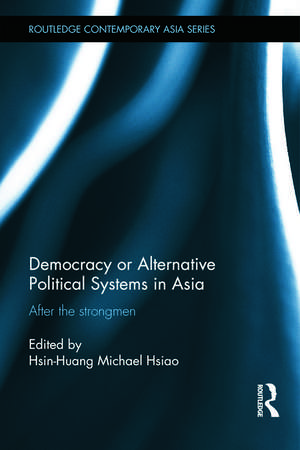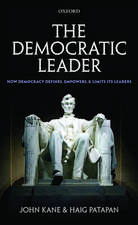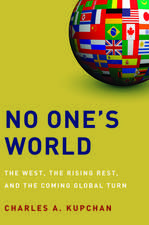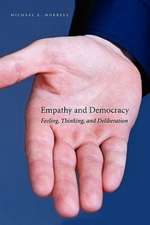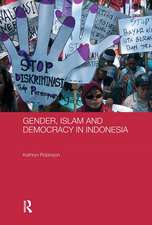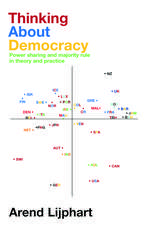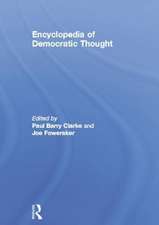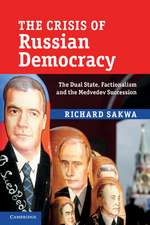Democracy or Alternative Political Systems in Asia: After the Strongmen: Routledge Contemporary Asia Series
Editat de Hsin-Huang Michael Hsiaoen Limba Engleză Hardback – 17 dec 2013
This book examines seven countries that were previously under authoritarian or semi-authoritarian rule, but then followed very different trajectories towards increasing liberalization after the fall of political strongmen: South Korea, Taiwan, China, the Philippines, Indonesia, Malaysia and Thailand. Importantly, the case studies reveal the factors that may enable transition to a more democratic system, and alternatively, the factors that inhibit democratic transition and push countries down a more authoritarian path. In turn, three key models that follow the fall of a political strongman emerge: democratization with substantial political reform and consolidation; democratization with limited political reform, leading to weak democratic institutions and instability; and an alternative political system with sustained authoritarianism. By tracing these very different paths and outcomes in the wake of a strongman’s fall, the contributors present valuable information for countries on the course towards democratization, as well as governments and organisations who work to facilitate this process.
This book will be welcomed by students and scholars interested in Asian politics, governance and democratization studies.
| Toate formatele și edițiile | Preț | Express |
|---|---|---|
| Paperback (1) | 469.34 lei 6-8 săpt. | |
| Taylor & Francis – 3 mar 2016 | 469.34 lei 6-8 săpt. | |
| Hardback (1) | 1057.40 lei 6-8 săpt. | |
| Taylor & Francis – 17 dec 2013 | 1057.40 lei 6-8 săpt. |
Din seria Routledge Contemporary Asia Series
- 18%
 Preț: 702.95 lei
Preț: 702.95 lei - 9%
 Preț: 934.94 lei
Preț: 934.94 lei -
 Preț: 325.78 lei
Preț: 325.78 lei -
 Preț: 343.95 lei
Preț: 343.95 lei - 9%
 Preț: 935.97 lei
Preț: 935.97 lei - 18%
 Preț: 1061.57 lei
Preț: 1061.57 lei - 23%
 Preț: 321.87 lei
Preț: 321.87 lei - 26%
 Preț: 821.29 lei
Preț: 821.29 lei -
 Preț: 412.57 lei
Preț: 412.57 lei -
 Preț: 399.58 lei
Preț: 399.58 lei - 18%
 Preț: 1064.70 lei
Preț: 1064.70 lei - 18%
 Preț: 1060.87 lei
Preț: 1060.87 lei -
 Preț: 118.80 lei
Preț: 118.80 lei - 25%
 Preț: 825.06 lei
Preț: 825.06 lei - 49%
 Preț: 543.60 lei
Preț: 543.60 lei - 18%
 Preț: 1063.89 lei
Preț: 1063.89 lei -
 Preț: 248.10 lei
Preț: 248.10 lei - 25%
 Preț: 824.89 lei
Preț: 824.89 lei - 18%
 Preț: 704.83 lei
Preț: 704.83 lei -
 Preț: 363.20 lei
Preț: 363.20 lei - 18%
 Preț: 1062.62 lei
Preț: 1062.62 lei -
 Preț: 488.71 lei
Preț: 488.71 lei - 18%
 Preț: 1058.43 lei
Preț: 1058.43 lei - 18%
 Preț: 1058.10 lei
Preț: 1058.10 lei - 18%
 Preț: 1060.87 lei
Preț: 1060.87 lei - 18%
 Preț: 1064.01 lei
Preț: 1064.01 lei - 18%
 Preț: 1050.09 lei
Preț: 1050.09 lei - 18%
 Preț: 1061.93 lei
Preț: 1061.93 lei - 18%
 Preț: 711.10 lei
Preț: 711.10 lei - 18%
 Preț: 1059.84 lei
Preț: 1059.84 lei - 12%
 Preț: 298.61 lei
Preț: 298.61 lei -
 Preț: 364.94 lei
Preț: 364.94 lei - 18%
 Preț: 733.20 lei
Preț: 733.20 lei -
 Preț: 416.96 lei
Preț: 416.96 lei - 18%
 Preț: 1057.13 lei
Preț: 1057.13 lei - 18%
 Preț: 1057.05 lei
Preț: 1057.05 lei - 18%
 Preț: 1276.26 lei
Preț: 1276.26 lei - 18%
 Preț: 1057.05 lei
Preț: 1057.05 lei - 18%
 Preț: 1061.93 lei
Preț: 1061.93 lei - 18%
 Preț: 1109.99 lei
Preț: 1109.99 lei - 18%
 Preț: 732.06 lei
Preț: 732.06 lei
Preț: 1057.40 lei
Preț vechi: 1289.52 lei
-18% Nou
Puncte Express: 1586
Preț estimativ în valută:
202.36€ • 209.05$ • 168.41£
202.36€ • 209.05$ • 168.41£
Carte tipărită la comandă
Livrare economică 26 martie-09 aprilie
Preluare comenzi: 021 569.72.76
Specificații
ISBN-13: 9780415677257
ISBN-10: 0415677254
Pagini: 200
Ilustrații: 5 tables
Dimensiuni: 156 x 234 x 17 mm
Greutate: 0.53 kg
Ediția:New.
Editura: Taylor & Francis
Colecția Routledge
Seria Routledge Contemporary Asia Series
Locul publicării:Oxford, United Kingdom
ISBN-10: 0415677254
Pagini: 200
Ilustrații: 5 tables
Dimensiuni: 156 x 234 x 17 mm
Greutate: 0.53 kg
Ediția:New.
Editura: Taylor & Francis
Colecția Routledge
Seria Routledge Contemporary Asia Series
Locul publicării:Oxford, United Kingdom
Public țintă
Postgraduate and UndergraduateCuprins
Part I: Overview 1. After the Strongmen: The Beginning of Democracy in Asia? 2. Personalist Leadership Styles and Legacies: A Comparative Survey of East and Southeast Asian Nations Part II: Northeast Asia 3. Taiwan’s Democratization after the Strongmen: Leadership Matters 4. After Chun Doo-Hwan: Progress of Democratization and Residue of Authoritarianism in South Korea 5. China after Deng Xiaoping: The Search for a Non-Democratic Development Model Part III: Southeast Asia 6. Unchanged after Changes: The Philippines after Marcos 7. Malaysia after Mahathir: Late Democratization Amidst Development, the Strong Developmental State and Developmentalism, 8. Indonesia’s Quest for a Democratic Culture: Pluralism, Tolerance and Rule of Law, 1998-2013 9. Rise and Fall of Thaksin Shinawatra and the New Politics in Thailand
Notă biografică
Hsin-Huang Michael Hsiao is Distinguished Research Fellow and Director of the Institute of Sociology, Academia Sinica, Taiwan.
Descriere
This book tackles the important issue of what happened to Asia's political systems after the fall of various political strongmen? It is generally assumed that once strongmen who dictate a nations' politics with a dictatorial or authoritarian fashion fall, the political landscape then drastically changes and the prospects for democracy comes in a matter of time. As the contributors of this book show, the stories were not so simple and straightforward in the contexts of Northeast and Southeast Asia. Democratic governance is only one of the three possible and feasible outcomes, the other two outcomes are either a weakening/ unstable political leadership or a sustained authoritarian system.
